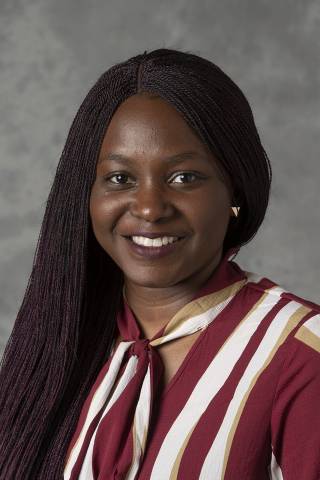
How would you describe your area of study or work?
My current area of study is Biomechanical Engineering. Specifically, I address visual impairment and sight loss, which is currently costing the UK economy billions of pounds. The aim of my work is to develop aerosol spraying instructions for potential stem-cell treatments to treat degenerative eye disease leading to blindness, such as glaucoma. I do this using mathematical modelling to predict how these cell-based therapies could hopefully restore blindness and also reduce animal studies. The ultimate goal of such treatment is to be able to spray stem-cells into the human eye, to help repair damaged cells inside the eye and still help them survive.
What is your favorite part of your job/area of study/area of research?
My favourite part of my job is being able to meet with people from different backgrounds and communicate my research and foreseeing contribution that such innovation can bring across generations and improve one’s quality of life.
What is the most valuable lesson you have learnt during your studies/career so far?
I have learned numerous lessons. What I believe stands out is being able to master the art of communication about medical engineering. There are so many people out there that have a blurred vision of who engineers are and what they do. I humbly take pride in being able to explain to people on a daily basis what I do and how the field of biomechanical engineering has been changing over recent years and continues to do so. I would also say what I have learned is to take every mistake or failure as a valuable lesson and a learning platform.
Describe your day-to-day life as an engineer/engineering student
My day starts pretty early with a morning workout, as it gives me a fresh start for the day. Is not easy, especially when you are the first one up and you know the rest of your neighborhood is fast asleep. I plan what to do on the day either the night before or before leaving the office. Sometimes I revise my plan on the train just to ensure it’s realistic enough! I then make my way into university, have breakfast (or anything close to it), go through my emails briefly and then go through my plan for the day. This varies on a daily basis. I might be going through a set of simulations or I might be preparing for a presentation, doing some experiments or attending meetings and planning the next outreach activities. This is what keeps me on my toes and what I enjoy the most about what I do! Every day is different and it keeps the dynamic alive.
What attracted you to participate in outreach and engagement activities?
I discovered a talent I did not realise I had whilst running events and activities for a wide range of different and diverse audiences. When I graduated, I was given the great opportunity to be involved in organising outreach activities for prospective engineering students and school pupils that could potentially develop an interest in engineering whilst in education. I loved the adrenaline involved in organising such events but also the idea of knowing that what I had learned was inspiring a new generation. I wish I had had a female engineer as a role model when I was at school; there are many children and young people, especially from under represented backgrounds, who would really benefit from meeting and having direct access to engineers. Being able to give that with my experience, I take it as a privilege.
What is the best thing about being involved in outreach activities?
Enabling children to understand that there are multiple ways of developing a solution and looking at a problem - that’s what engineering is about. You learn every day, I certainly did and still do! I even learned from groups I taught and that aspect has always challenged my thinking.
What type of activities or programmes have you led/run?
Just to name a few, I have been involved in developing different types of medical devices for individuals with a form of physical impairment; designed trebuchets and parachutes; designed moving vehicles; developed teaching resources for primary school children and contributed to Continued Professional Development training for secondary school teacher leads.
What outreach activity or programme are you most proud to have been involved with?
It has been wonderful to be involved in so many different outreach activities, but I would say I am most proud of developing a series of Key Stage 2 teaching resources explaining how many different engineers it takes to make an ice cream. In the teaching resources I was able to integrate university-style teaching, team work as well as individual research.
What advice would you give young people wanting to study or work in STEM-related fields?
Keep doing what you do, and don’t stop at the first or tenth obstacle as you will learn every day. Keep going and keep loving what you do. What you have is unique and work on being the best version of yourself. Make sure you have a good support network and someone to talk to when things get tough!
 Close
Close

